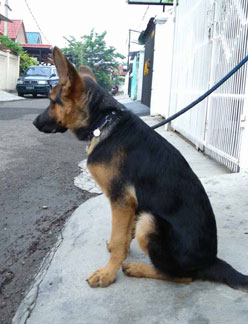A Discussion of von Willebrands Disease
What is von Willebrands? von Willebrands disease (vWD) occurs in both humans and animals. In dogs, it is currently the most commonly inherited bleeding disorder.
Dogs of any breed (even mixed breed dogs) can have vWD but certain dog breeds seem more prone to von Willebrands Disease than others. This condition is very similar to that of hemophilia in humans.
Certain breeds have a higher incidence of vWD than others.German Shepherds, Doberman Pinschers, Shetland Sheepdogs, Chesapeake Bay Retrievers, German Shorthaired Pointers, Golden Retrievers, Standard Poodles, and Scottish Terriers all have a higher than normal incidence of von Willebrands Disease, showing that it can possibly be inherited.
What is von Willebrands disease?
Basically, vWD is a blood disorder. Von Willebrand factor (vWF) is a protein that improves clot formation. The affected dog or animal is deficient in the blood clotting factor (von Willebrand factor).
The blood of dogs affected by this disease does not effectively clot properly and therefore these dogs are more likely to have prolonged bleeding episodes connected with any kind of trauma or surgery.

Von Willebrand's disease (vWD) is often described to be a common and usually mild, inherited bleeding disorder in both people and in dogs. Because of the deficient clotting of their blood, dogs with Von Willebrand's disease bleed excessively when injured - similar to hemophilia in humans.
There are 3 forms of this disease based on vWF concentration and function. Dogs with Type I vWD (by far the most common) have mild to moderate bleeding abnormalities, depending on the level of vWF. The much rarer types II and III vWD can cause severe bleeding episodes.
What are the symptoms of von Willebrands Disease?
Excessive bleeding is the main symptom of vWD. Affected dogs are also prone to bleeding episodes such as nose bleeds and blood in the stool. It is often characterized as well by hematomas, or bleeding from the gums and intermittent limping (due to bleeding into the joints which can cause symptoms similar to those of arthritis).
Affected dogs with vWD may also have prolonged bleeding from small or superficial wounds. Be warned, however, excessive bleeding can lead to anemia, shock, and death (if untreated) so do not underestimate this condition.
What are the risks of having a dog with von Willebrands disease?
Dogs affected with von Willebrand's disease, without treatment, can easily bleed to death following any type of surgery, or through any injury that would otherwise be considered less than life threatening.
How is von Willebrands disease treated?
The diagnosis of Von Willebrand's is made through a test, which checks for the level of Von Willebrand's factor in the dog's blood. Veterinarians have a new blood test that measures very small and very large amounts of vWF with great accuracy.
Accurately measuring the levels of vWF helps predict if a dog will be affected by vWD or will merely be a carrier of it - unaffected by the disease but with the potential to pass along the defect to its offspring. This condition cannot be cured but it can be managed. Your veterinarian will discuss this with you if the diagnosis of vWD is made concerning your dog.
If your dog is affected with vWD, you should be prepared to control mild bleeding instances yourself by applying prolonged pressure on many wounds. In other circumstances, veterinary care such as cautery or sutures may be required depending on the severity.
Severe bleeding episodes can be treated by administering a source of von Willebrand factor through a transfusion to your dog. Your veterinarian may recommend a transfusion pre-operatively as a precaution if your dog requires surgery, depending on the severity of the dogs bleeding disorder, and the type of surgery needed by your dog.
Thyroid supplements may help to control bleeding, if your veterinarian determines that your dog is hypothyroid. For dogs with late-onset vWD associated with hypothyroidism (insufficient thyroid-hormone levels), treatment with thyroid-hormone supplementation often alleviates the vWD as well.
Injury prevention is one main precaution to be aware of if your dog is afflicted with von Willebrand's disease. Don't let your dog play roughly with other dogs or chew on sticks or sharp bones.
If your dogs gums tend to bleed, it would be best to feed your dog
only soft foods. If your vWD dog ever needs surgery, your veterinarian
will need to take special precautions to minimize bleeding during and
after surgery.
Genetic counselling for von Willebrands Disease
Currently there is no cure for von Willebrand's disease. Keeping affected animals out of any breeding program should be the goal of all dog breeding programs - and most especially those breeds commonly affected by this disease.
Tests are available to determine which dogs may have this trait. Dogs
that have von Willebrand's disease and those who are carriers should not
be used for breeding at any time.
What does von Willebrands disease mean to you and your dog?
In dogs affected with vWD, it is best to consult your veterinarian before using any kind of over-the-counter medications. Drugs such as aspirin should always be avoided in dogs with bleeding disorders. Most dogs affected by vWD can lead normal lives with proper care and management of the dogs environment.
It is important to note that other illnesses, or physical or emotional stress may also worsen bleeding episodes. With gentle handling and great attention to care, a dog with vWD can offer its people many years of devoted companionship.
Return from von Willebrands Disease to Grooming the GSD
"I had rather be a dog, and bay the moon, Than such a Roman. - William Shakespeare
Sign up for promotions, news, discounts, and the chance to win prizes for you and your German Shepherd
